|
|
|
Sort Order |
|
|
|
Items / Page
|
|
|
|
|
|
|
| Srl | Item |
| 1 |
ID:
190840
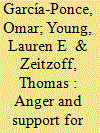

|
|
|
|
|
| Summary/Abstract |
How does exposure to criminal violence shape attitudes towards justice and the rule of law? Citizens care about crime prevention and procedural legality, yet they also value punishing perpetrators for the harm they have done. We argue that anger induced by exposure to criminal violence increases the demand for retribution and harsh punishments, even at the expense of the rule of law. We test this theory using one observational and two experimental studies from an original survey of 1,200 individuals in Western Mexico, a region affected by organized criminal violence and vigilantism. First, we first show that exposure to violence is correlated with increased anger and support for punitive justice, including vigilante actions. Second, across our two experiments, we show that citizens are more supportive of harsh punishments and place less value on their legality in response to morally outrageous crimes. Third, we find that the innocence of the victim, rather than the severity of the crime, is what triggers outrage and punitiveness. This suggests that citizens may support extreme levels of violence as long as they perceive that its targets are criminals. Finally, we show that outrageous forms of violence against civilians can lead individuals to prioritize harsh punishment regardless of its legality. When criminal actors target perceived innocents with common crimes like extortion, there is greater support for harsh, vigilante action. These patterns provide a bottom-up explanation for harsh justice.
|
|
|
|
|
|
|
|
|
|
|
|
|
|
|
|
| 2 |
ID:
044595
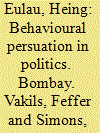

|
|
|
|
|
| Publication |
Bombay, Vakils, Feffer and Simons, 1963.
|
| Description |
x, 153p.
|
| Series |
Perspective series
|
|
|
|
|
|
|
|
|
|
|
|
Copies: C:1/I:0,R:0,Q:0
Circulation
| Accession# | Call# | Current Location | Status | Policy | Location |
| 023008 | 320.019/EUL 023008 | Main | On Shelf | General | |
|
|
|
|
| 3 |
ID:
121595
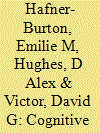

|
|
|
|
|
| Publication |
2013.
|
| Summary/Abstract |
Experimental evidence in cognitive psychology and behavioral economics is transforming the way political science scholars think about how humans make decisions in areas of high complexity, uncertainty, and risk. Nearly all those studies utilize convenience samples of university students, but in the real world political elites actually make most pivotal political decisions such as threatening war or changing the course of economic policy. Highly experienced elites are more likely to exhibit the attributes of rational decision-making; and over the last fifteen years a wealth of studies suggest that such elites are likely to be more skilled in strategic bargaining than samples with less germane experience. However, elites are also more likely to suffer overconfidence, which degrades decision-making skills. We illustrate implications for political science with a case study of crisis bargaining between the US and North Korea. Variations in the experience of US elite decision-makers between 2002 and 2006 plausibly explain the large shift in US crisis signaling better than other rival hypotheses such as "Iraq fatigue." Beyond crisis bargaining other major political science theories might benefit from attention to the attributes of individual decision-makers.
|
|
|
|
|
|
|
|
|
|
|
|
|
|
|
|
| 4 |
ID:
175335
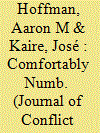

|
|
|
|
|
| Summary/Abstract |
Exposure to a single report about terrorism in the mass media can trigger a range of emotional and political reactions. The consequences of exposure to several terrorism reports in row, however, are a matter of controversy. We examine the effects of prolonged terrorism coverage using an experimental design that combines self-report measures of emotions and political attitudes with instantaneous biometric data on emotions. Consistent with research on nonassociational learning, we find that exposure to multiple videos habituates people to depictions of terrorism: the longer people watch terrorism coverage, the less intense their reactions are to the images of terrorism they see. Some images and videos, however, contribute to this result more than others. This suggests that the ultimate effects of terrorism coverage depend on the interplay between the quantity and quality of reporting, not the quantity alone.
|
|
|
|
|
|
|
|
|
|
|
|
|
|
|
|
| 5 |
ID:
178457
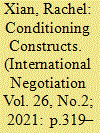

|
|
|
|
|
| Summary/Abstract |
Political psychology and social constructivism exist in an “ideational alliance” against realism; however, both have overlooked behavioral conditioning, the basis of animal learning. Through six stages situated in international negotiation behaviors, the theory of Conditioning Constructs shows how behavioral conditioning can take parties from specific to diffuse reciprocity, rationalist to constructivist cooperation, and crisis to durable peace. In stages 1, 2 and 3, parties use negotiated agreements to exit prisoner’s dilemmas, continuously reinforce cooperation during agreement implementation, and satiate to rewards as initial implementation finalizes. In stages 4, 5 and 6, parties receive fresh rewards with new negotiations, undergo intermittent reinforcement with periodic agreements thereafter, and finally attribute cooperative behavior to actor constructs. Conditioning Constructs demonstrates that agency is possible in socially constructed structures through willful participation in conditioning through negotiation; and that, while Anatol Rapoport’s tit-for-tat strategy is suited to initial cooperation, intermittent reinforcement better preserves late-stage cooperation.
|
|
|
|
|
|
|
|
|
|
|
|
|
|
|
|
| 6 |
ID:
111958
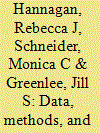

|
|
|
|
|
| Publication |
2012.
|
| Summary/Abstract |
Within the subfields of political psychology and the study of gender, the introduction of new data collection efforts, methodologies, and theoretical approaches are transforming our understandings of these two fields and the places at which they intersect. In this article we present an overview of the research that was presented at a National Science Foundation (NSF) (#SES-1014854) funded conference "New Research on Gender in Political Psychology" at Rutgers University in March 2011. This scholarship represents the expanding questions and approaches that enhance our understanding of gender within political psychology. As a result, we suggest that further innovation is needed with regard to theory and methods to understand better how gender shapes the political attitudes and actions of individuals. Our discussion here covers the use of data, interdisciplinary methods, and intersectionality to study gender. We conclude with thoughts about the theoretical implications of this recent scholarship and the future of political science research on gender.
|
|
|
|
|
|
|
|
|
|
|
|
|
|
|
|
| 7 |
ID:
032000
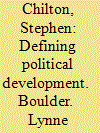

|
|
|
|
|
| Publication |
Boulder, Lynne Rienner Publisher, 1988.
|
| Description |
vii, 133p.
|
| Series |
GSIS monography series in world affairs
|
| Standard Number |
1555870864
|
|
|
|
|
|
|
|
|
|
|
|
Copies: C:2/I:0,R:0,Q:0
Circulation
| Accession# | Call# | Current Location | Status | Policy | Location |
| 029301 | 306.2/CHI 029301 | Main | On Shelf | General | |
| 029749 | 306.2/CHI 029749 | Main | On Shelf | General | |
|
|
|
|
| 8 |
ID:
152663
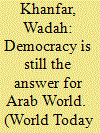

|
|
|
| 9 |
ID:
110666
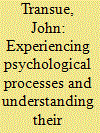

|
|
|
|
|
| Publication |
2011.
|
| Summary/Abstract |
This article presents three classroom demonstrations designed to help instructors who would like to include some political psychology in their classes. All three demonstrations involve student participation and give the students direct experience with psychological processes relevant to political science. Specifically, I describe how I present the Stroop task, a priming task, and Tversky and Kahneman's Asian disease experiment in my own teaching. For each of the demonstrations, I give practical advice for classroom use, a short description of the psychological processes the demonstration illustrates, and a brief discussion of how those processes have been applied in political science.
|
|
|
|
|
|
|
|
|
|
|
|
|
|
|
|
| 10 |
ID:
068555
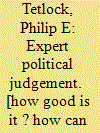

|
|
|
|
|
| Publication |
Princeton, Princeton University Press, 2005.
|
| Description |
xvi, 321p.
|
| Standard Number |
0691123020
|
|
|
|
|
|
|
|
|
|
|
|
Copies: C:1/I:0,R:0,Q:0
Circulation
| Accession# | Call# | Current Location | Status | Policy | Location |
| 051071 | 320.019/TET 051071 | Main | On Shelf | General | |
|
|
|
|
| 11 |
ID:
113337


|
|
|
| 12 |
ID:
186591
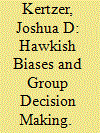

|
|
|
|
|
| Summary/Abstract |
How do cognitive biases relevant to foreign policy decision making aggregate in groups? Many tendencies identified in the behavioral decision-making literature—such as reactive devaluation, the intentionality bias, and risk seeking in the domain of losses—have been linked to hawkishness in foreign policy choices, potentially increasing the risk of conflict, but how these “hawkish biases” operate in the small-group contexts in which foreign policy decisions are often made is unknown. We field three large-scale group experiments to test how these biases aggregate in groups. We find that groups are just as susceptible as individuals to these canonical biases, with neither hierarchical nor horizontal group decision-making structures significantly attenuating the magnitude of bias. Moreover, diverse groups perform similarly to more homogeneous ones, exhibiting similar degrees of bias and marginally increased risk of dissension. These results suggest that at least with these types of biases, the “aggregation problem” may be less problematic for psychological theories in international relations than some critics have argued. This has important implications for understanding foreign policy decision making, the role of group processes, and the behavioral revolution in international relations.
|
|
|
|
|
|
|
|
|
|
|
|
|
|
|
|
| 13 |
ID:
130947
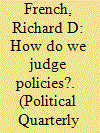

|
|
|
|
|
| Publication |
2014.
|
| Summary/Abstract |
Political science has paid scant attention to the way that citizens judge public policy, assuming that citizens do so, or should do so, in ways familiar to academics themselves, depending upon which of the various schools of thought they endorse. This paper argues that approaching citizens' judgement realistically requires attention to political psychology. Indeed, our conception of citizen judgement can be enriched by attention to research and theory in cognitive psychology and neuroscience. That work emphasises that much judgement occurs spontaneously and very rapidly, that it is involuntary and non-semantic and that it depends upon the emotional impact of experience rather than conscious weighing of situations against explicit standards of assessment such as science, self-interest or moral theory. A moral psychology for public life is sketched out, with implications for judgment by politicians.
|
|
|
|
|
|
|
|
|
|
|
|
|
|
|
|
| 14 |
ID:
167404
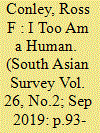

|
|
|
|
|
| Summary/Abstract |
This study explores the political psychology of General Pervez Musharraf, Pakistan’s most recent military dictator. It categorises his ‘operational code’—a collection of general political beliefs assessed from spoken and/or written statements—over four periods of his nine years of power.
|
|
|
|
|
|
|
|
|
|
|
|
|
|
|
|
| 15 |
ID:
053273
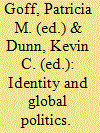

|
|
|
|
|
| Publication |
New York, Palgrave, 2004.
|
| Description |
xiii, 268p.
|
| Series |
Culture and religion in international relations
|
| Standard Number |
1403963797
|
|
|
|
|
|
|
|
|
|
|
|
Copies: C:1/I:0,R:0,Q:0
Circulation
| Accession# | Call# | Current Location | Status | Policy | Location |
| 048499 | 306.2/GOF 048499 | Main | On Shelf | General | |
|
|
|
|
| 16 |
ID:
164818
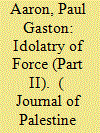

|
|
|
|
|
| Summary/Abstract |
Building on “The Idolatry of Force: How Israel Embraced Targeted Killing,” published in the Autumn 2017 issue of the Journal of Palestine Studies, this companion piece examines the practices through which Israel's garrison state normalizes aggressive militarism and indifference to the pain of others. Political discourse and semantics, media, pedagogical instruction, religious training, and the shared experience of army service all feed into a warrior code and culture where combat and preparations for combat become second nature, and where violence, no matter how extreme and disproportionate, assumes collective legitimacy. A broad rhetorical repertoire is deployed to craft a narrative of virtue, sacrifice, and necessity. Key to this narrative are the threat to national survival posed by demonic enemies and the spiritual valor embodied and replenished in the struggle to vanquish them.
|
|
|
|
|
|
|
|
|
|
|
|
|
|
|
|
| 17 |
ID:
111959
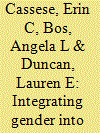

|
|
|
|
|
| Publication |
2012.
|
| Summary/Abstract |
The New Research on Gender in Political Psychology Conference brought together new and experienced teachers with interests in gender politics. The conference session "Teaching Gender throughout the Curriculum" generated a great deal of discussion concerning the pedagogical practice of gender mainstreaming. Gender mainstreaming-the integration of gendered content into courses required for a major-was recognized as one of 11 recommendations for reforming the undergraduate political science curriculum in the 1991 APSA report "Liberal Learning an The Political Science Major: A Report to the Profession" (popularly referred to as the Wahlke Report). Little information is available on the prevalence of gender courses in the undergraduate curriculum, but the data that does exist suggest such courses are uncommon (Brandes et al. 2001). We found virtually no data on the practice of gender mainstreaming in political science and little data in the way of assessing the impact of gendered content when students are exposed to it. This absence of data suggests gender mainstreaming has not emerged as a serious priority for curricular reform.
|
|
|
|
|
|
|
|
|
|
|
|
|
|
|
|
| 18 |
ID:
124360
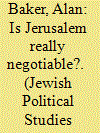

|
|
|
|
|
| Publication |
2012.
|
| Summary/Abstract |
On August 21, 2012, Palestinian Authority leader Mahmoud Abbas, referring to "the alleged [Jewish] Temple" in Jerusalem, stated that "there will be no peace, security, or stability unless the occupation, its settlements and settlers will be evacuated from our holy city and the eternal capital of our state."1 This statement, basically denying any Jewish linkage or right to Jerusalem, uttered by the head of the Palestinian Authority who is considered in the international community to be moderate and reasonable, serves as an example of the tremendous political, historical, psychological, legal, and religious challenge that the issue of Jerusalem poses to the Middle East negotiating process. This study analyzes the various aspects of this challenge, with a view to determining why a resolution of the Jerusalem question has defied all past negotiators, raising serious questions about the possibility of reaching agreement between the parties regarding Jerusalem. Beginning with a brief summary of the significance of Jerusalem to each religious community as well as to the world at large, this study analyzes the various international instruments making reference to Jerusalem, and lists proposals published over the years for solving the issue of Jerusalem.
|
|
|
|
|
|
|
|
|
|
|
|
|
|
|
|
| 19 |
ID:
049980
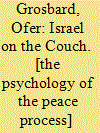

|
|
|
|
|
| Publication |
Albany, State University of New York press, 2003.
|
| Description |
xvii, 195p.pbk
|
| Series |
Suny Series in Israeli Studies
|
| Standard Number |
0791456064
|
|
|
|
|
|
|
|
|
|
|
|
Copies: C:1/I:0,R:0,Q:0
Circulation
| Accession# | Call# | Current Location | Status | Policy | Location |
| 047394 | 956.053/GRO 047394 | Main | On Shelf | General | |
|
|
|
|
| 20 |
ID:
133584
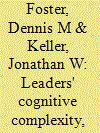

|
|
|
|
|
| Publication |
2014.
|
| Summary/Abstract |
Some scholars have suggested that when faced with domestic political problems, leaders employ simplified decision processes, preferring action to deliberation and highly visible diversionary uses of force to alternative policies. Others contend that domestically embattled leaders will pursue a more rational examination of the costs and benefits of various options-the sort of deliberation that will lead them to reject diversionary force in favor of less risky measures. Drawing on research in political psychology, we argue that leaders' cognitive processes are not constants but variables, and that both models are correct under certain circumstances. Leaders low in conceptual complexity (CC), and especially those with hawkish leanings, will pursue simplified decision-making procedures and embrace diversionary strategies, while leaders who are high in complexity will pursue a more thorough consideration of risks and alternatives and generally avoid diversionary actions. We examine these expectations by testing the interactive effect of economic misery and leaders' CC on American force usage for the period 1953-2000. The findings indicate that more conceptually simple leaders-particularly when high in distrust, a trait linked to more hawkish policy inclinations-are significantly more likely to engage in diversion.
|
|
|
|
|
|
|
|
|
|
|
|
|
|
|
|
|
|
|
|
|